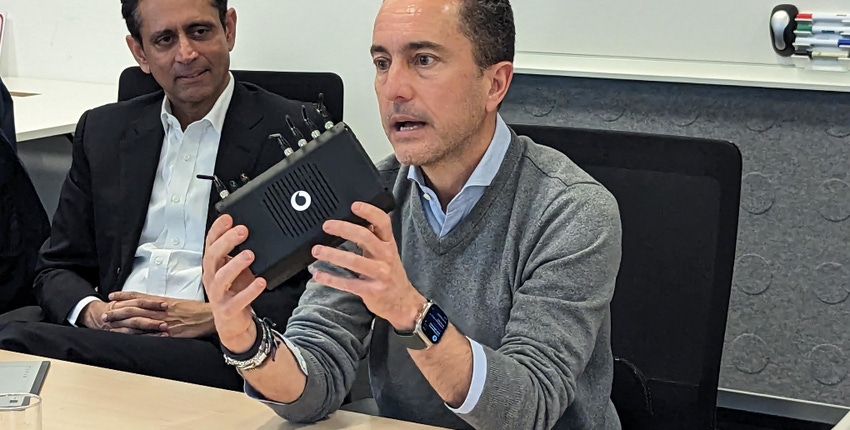Operator Vodafone’s R&D boffins have put together a device that functions as a 5G base station but runs on the simplest of hardware, apparently costing no more than a router.
February 20, 2023

Operator Vodafone’s R&D boffins have put together a device that functions as a 5G base station but runs on the simplest of hardware, apparently costing no more than a router.
Vodafone invited media and analysts to its Paddington HQ to show off the prototype gizmo that can apparently acts as a private 5G network. The headline innovation is that it is running off of a credit card sized Raspberry Pi computer within the housing, giving it both a small form factor price.
Developed at Vodafone’s European R&D Centre in Málaga, it can also extend 5G coverage or increase capacity, if needed. We were told during the demonstration that it can also be used as a 4G or 3G base station, an actual router, or even an FM radio.
Inside the box is a Raspberry Pi 4 with a small 5G compatible embeddable software-defined radio (SDR) circuit board, made by UK firm Lime Microsystems. We’re told this SDR board can turn any computing platform into a miniature 5G base station.
It seems to be targeted at small businesses who might like a private 5G network without the usual associated costs, and could also offer domestic users an additional broadband link at times when everyone’s trying to abuse the bandwidth at once with various streaming and gaming.
“We looked at what Raspberry Pi did for computing, in terms of making it more accessible to people of all ages, and we wanted to do the same with 5G,” said Santiago Tenorio, Vodafone’s Director of Network Architecture (pictured, with the device). “Whilst this is just a prototype, it has the potential to bring new cloud, AI and big data technologies within reach of many of the small businesses we support across Europe. The next step is to take ideas like this to a place where they can be developed and eventually produced. Our door is open to interested vendors.”
One thing that came up in the Q and A was that there isn’t really anything in terms of Vodafone IP involved in the device – meaning anyone could go ahead and make their own should there turn out to be a demand for it. But Vodafone didn’t seem particularly concerned by that prospect and the whole venture was pitched as more about driving the development of a new generation of radios for the industry. To that point, we are told in the associated release:
“Vodafone is now looking at ways to democratise MPNs and extend their benefits to micro and small business owners whilst lowering the entry cost and reducing the resources needed to experience new digital services,” says the release. The device connects with any Open RAN device and there is clearly a fair bit of that behind it all.’
The ‘secret sauce’ is actually the SDR card, so this announcement is as much a showcase of what can be done when so much of the base station now comes in software form. The device, which doesn’t appear to have a name, will be on show at MWC. One thing you can say for it is that it’s a good example of an operator innovating and diversifying whilst still leaning on their core competencies.
Get the latest news straight to your inbox. Register for the Telecoms.com newsletter here.
About the Author(s)
You May Also Like








.png?width=300&auto=webp&quality=80&disable=upscale)


_1.jpg?width=300&auto=webp&quality=80&disable=upscale)


.png?width=800&auto=webp&quality=80&disable=upscale)